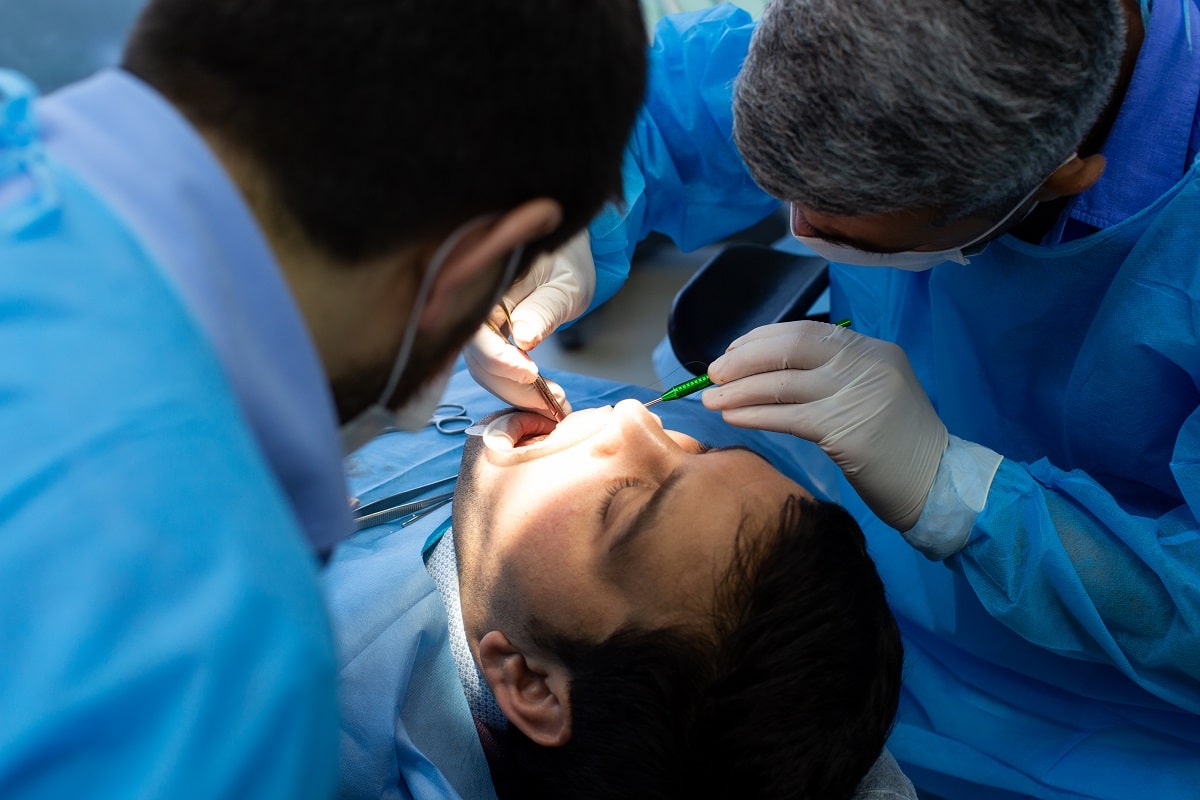Unbearable tooth pain can be a distressing and debilitating experience. Whether it comes on suddenly or gradually builds up over time, tooth pain can disrupt our daily lives and make it challenging to focus on anything else. So, it is essential to understand the causes, types, and signs of tooth pain, as well as the available treatment options, to find relief and restore our oral health.
In this article, we will explore practical approaches to relieve unbearable tooth pain and address some frequently asked questions on the subject.
What Causes Tooth Pain?
Tooth pain can have various causes, and pinpointing the exact source of the pain is crucial for effective treatment. Here are some common causes of severe tooth pain:
- Dental Decay: Tooth decay, also known as dental caries, is one of the leading causes of tooth pain. When bacteria in the mouth produce acids that erode the tooth enamel, it leads to cavities, which can expose the sensitive inner layers of the tooth, causing pain.
- Dental Abscess: An abscess occurs when a bacterial infection develops within the tooth or the surrounding gum tissue. The accumulation of pus can result in severe and throbbing tooth pain.
- Gum Disease: Advanced gum disease, also called periodontitis, can cause gum recession, exposing the tooth roots. This exposure can lead to tooth sensitivity and pain.
- Dental Trauma: An injury or trauma to the tooth, such as a fracture or a knocked-out tooth, can cause immediate and intense tooth pain.
- Teeth Grinding: Habitual teeth grinding, also known as bruxism, can exert excessive pressure on the teeth, leading to tooth pain and sensitivity.
Types Of Unbearable Tooth Pain
Tooth pain can manifest in different ways, depending on the underlying cause. Here are some common types of tooth pain:
- Sharp, Shooting Pain: This type of pain is often associated with dental decay, cavities, or exposed tooth nerves. It can be triggered by eating or drinking hot or cold foods and beverages.
- Throbbing Pain: Throbbing tooth pain is commonly associated with dental abscesses or infections. It can be persistent and severe, often accompanied by swelling and a bad taste in the mouth.
- Persistent, Dull Ache: A dull, constant ache in the tooth may indicate chronic tooth grinding, gum disease, or an underlying dental problem. The pain may intensify when biting or chewing.
- Sensitivity to Temperature: If you experience sharp, fleeting pain when consuming hot or cold foods and drinks, you may have tooth sensitivity. This sensitivity can be caused by exposed tooth roots or worn enamel.
Signs Of Tooth Nerve Pain And Damage
Unbearable tooth pain may be an indication of nerve pain or damage within the tooth. Some signs and symptoms that suggest nerve involvement include:
Severe and Continuous Pain: Intense, unrelenting pain that persists even after the stimulus is removed can indicate tooth nerve pain. When severe and continuous pain is present, it is crucial to seek professional dental care promptly. Ignoring or delaying treatment for tooth nerve pain can have serious consequences, as the condition may worsen and potentially lead to irreversible damage to the tooth and surrounding tissues. A dentist will conduct a comprehensive examination to determine the cause of the nerve pain and develop an appropriate treatment plan.
Prolonged Sensitivity: Prolonged sensitivity in a tooth is a significant indication that something is amiss with its nerve function. When your tooth continues to be sensitive to temperature changes or pressure for an extended period, it may suggest underlying nerve damage or irritation.
Normally, teeth are protected by a layer of enamel, which acts as a shield against external stimuli. However, when enamel wears down or gets damaged, the underlying dentin, a more sensitive layer of the tooth, becomes exposed. This exposure can lead to heightened sensitivity to hot or cold temperatures, as well as discomfort when biting or applying pressure.
In the case of prolonged sensitivity, where the sensitivity persists beyond a brief response to stimuli, it may indicate nerve involvement. Nerve damage can occur due to various reasons, including dental decay, trauma, or previous dental procedures. For example, deep dental decay that reaches the inner layers of the tooth can irritate or damage the nerves, leading to prolonged sensitivity.
Swelling and Inflammation: Swelling and inflammation in the surrounding gum tissue or visible swelling around the affected tooth can be alarming signs that suggest possible nerve involvement. When the nerves within the tooth are affected, it can trigger an immune response, leading to localised inflammation and swelling.
Nerve involvement can occur due to various reasons, such as dental infections, abscesses, or trauma. When bacteria penetrate the tooth, they can cause an infection that spreads to the surrounding tissues, resulting in inflammation and swelling. Additionally, an abscess, which is a pocket of pus caused by a bacterial infection, can form at the root of the tooth, leading to significant swelling and discomfort.
When swelling and inflammation occur, it is crucial to seek immediate dental attention. Ignoring these signs can lead to further complications and may result in the spread of infection to other parts of the oral cavity or even the bloodstream.
A dentist will carefully examine the affected tooth and surrounding tissues to determine the cause of the swelling and inflammation. They may perform diagnostic tests such as dental X-rays to assess the extent of the infection or abscess. Prompt diagnosis is essential to prevent the infection from spreading and causing more severe complications.
Should You Go To A Dentist If Your Tooth Pain Is Unbearable?
When tooth pain becomes unbearable, it is crucial to seek professional dental care promptly. Although home remedies and over-the-counter pain relievers can provide temporary relief, they do not address the underlying cause of the pain. A dentist will perform a thorough examination, diagnose the source of the pain, and recommend appropriate treatment options. Ignoring tooth pain can lead to further complications and potentially irreversible damage to the teeth and gums.
Furthermore, toothache can be a sign of a serious dental condition, such as an abscessed tooth, decay, gum disease, or a cracked tooth. These conditions require professional intervention to prevent them from worsening and causing more extensive damage. Delaying or avoiding dental treatment can result in the spread of infection, bone loss, tooth loss, and even systemic health problems.
A dentist has the knowledge, expertise, and tools necessary to accurately diagnose the cause of the unbearable tooth pain. They can conduct a comprehensive examination, which may include X-rays or other diagnostic tests, to identify the underlying issue. Once the cause is determined, the dentist can provide appropriate treatment to alleviate the pain and address the root problem.
Moreover, seeking prompt dental care for unbearable toothache can help manage discomfort and improve your overall quality of life. Severe tooth pain can be debilitating, affecting your ability to eat, speak, sleep, and concentrate on daily activities. By visiting a dentist, you can receive immediate relief through various pain management techniques, such as dental anesthesia or prescription medications.
Additionally, a dentist can offer personalised advice on how to prevent future dental problems and maintain good oral hygiene. They can educate you on proper brushing and flossing techniques, recommend suitable dental products, and provide guidance on dietary habits that promote oral health. Regular dental check-ups can also help detect any early signs of dental issues and prevent them from escalating into unbearable pain in the future.
Common Treatment Options Available For Tooth Pain
The treatment for unbearable tooth pain depends on the underlying cause and severity of the condition. Here are some common treatment options:
Dental Fillings: If tooth decay or cavities are causing the pain, the dentist may remove the decayed portion of the tooth and fill it with a dental filling material.
Root Canal Therapy: When the tooth nerve is infected or damaged, a root canal procedure may be necessary. It involves removing the infected nerve tissue, cleaning the root canal, and sealing it with a filling material.
Dental Extraction: In cases where the tooth is severely damaged, infected, or impacted, extraction may be the best course of action. The dentist will remove the affected tooth and discuss options for replacing it.
Antibiotics and Pain Medications: If there is an infection present, the dentist may prescribe antibiotics to eliminate the bacteria. Pain medications or anti-inflammatory drugs may also be recommended to alleviate discomfort.
FAQs Regarding Tooth Pain
- Can I use home remedies to relieve unbearable tooth pain?
While home remedies such as rinsing with warm salt water or applying a cold compress to the affected area can provide temporary relief, it is essential to consult a dentist for a proper diagnosis and treatment.
- How can I prevent tooth pain?
Maintaining good oral hygiene practices, such as brushing twice a day, flossing daily, and visiting the dentist regularly for check-ups and cleanings, can help prevent tooth pain. Avoiding excessive consumption of sugary foods and drinks and wearing a mouth guard if you grind your teeth can also be beneficial.
- Is it normal to experience tooth sensitivity after dental procedures?
Tooth sensitivity after dental procedures is a common occurrence and usually diminishes within a few days or weeks. However, if the sensitivity persists or worsens, it is crucial to seek professional advice and schedule a consultation with your dentist.
- Are there any preventive measures for tooth pain during pregnancy?
Maintaining good oral hygiene and visiting the dentist for regular check-ups are crucial during pregnancy. Hormonal changes can increase the risk of gum disease and tooth decay, so proper oral care is essential. Informing your dentist about your pregnancy is important to ensure any necessary precautions are taken during treatment.
- What should I do if I experience tooth pain while travelling?
If you experience tooth pain while travelling, it is important to seek dental care as soon as possible. Contact a local dentist in the area you are visiting and explain your symptoms. They can provide guidance, recommend over-the-counter pain relief options, or schedule an appointment for you to receive treatment.
- Can sinus problems cause tooth pain?
Yes, sinus problems can cause tooth pain. The roots of some upper teeth are close to the sinus cavities, and when the sinuses become inflamed or infected, the pressure can radiate to the teeth, causing pain. If you suspect that your tooth pain is related to sinus issues, it is advisable to consult a healthcare professional for an accurate diagnosis.
- Can tooth pain be a sign of an underlying dental condition?
Yes, tooth pain can be a sign of an underlying dental condition. Tooth decay, gum disease, tooth fractures, abscesses, and impacted wisdom teeth are some of the common dental issues that can cause tooth pain. If you are experiencing persistent or severe tooth pain, it is important to schedule an appointment with a dentist to determine the cause and receive appropriate treatment.
Conclusion
In conclusion, unbearable tooth pain can significantly impact our quality of life, but there are practical approaches to find relief. By understanding the causes, types, and signs of tooth pain, as well as seeking timely dental care, we can address the underlying issues and restore oral health. Remember, if your tooth pain becomes unbearable, consult a dentist promptly for a proper diagnosis and treatment plan tailored to your needs.
Taking care of your oral hygiene, maintaining regular dental check-ups, and adopting preventive measures can help prevent tooth pain and dental problems. It’s essential to follow good oral hygiene practices, including brushing your teeth twice a day with a fluoride toothpaste, flossing daily, and using mouthwash. Additionally, avoid excessive consumption of sugary foods and drinks, as they can contribute to tooth decay and pain.




